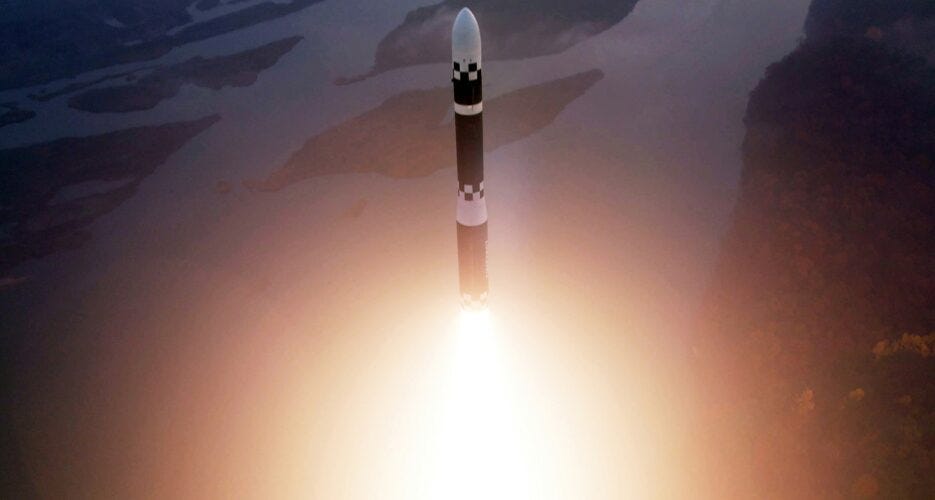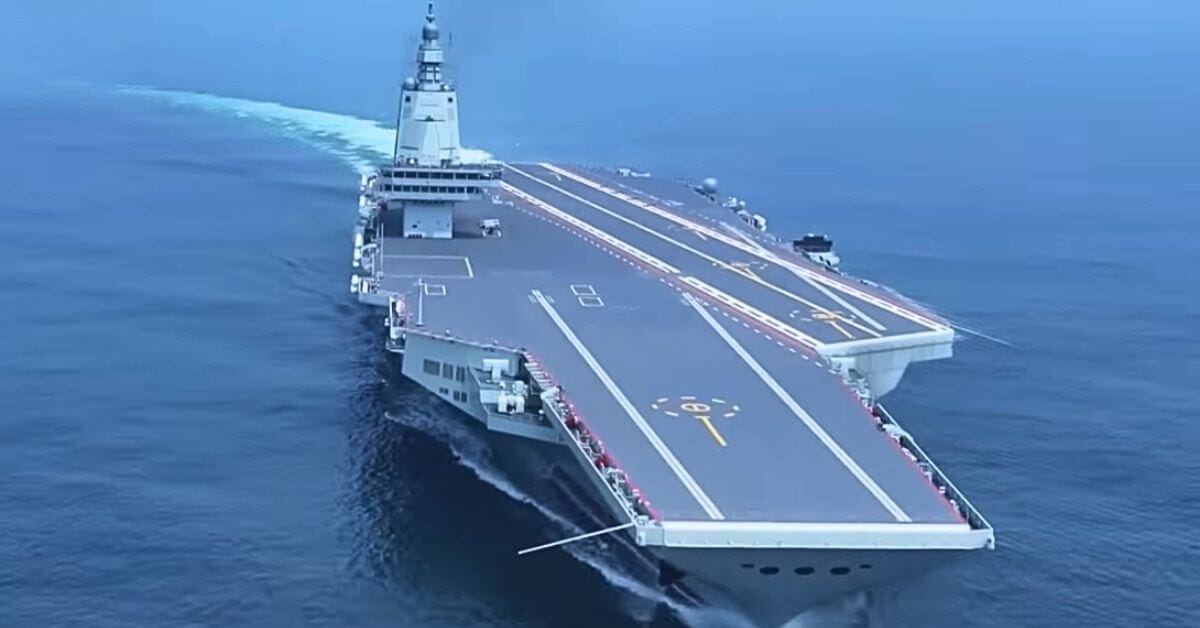10 Things Global News - 7th November 2025
Interesting and important news from around the world
Senate Blocks Move to Curb Trump’s Venezuela Strikes
US Expands Military Operations from El Salvador
UN Lifts Sanctions on Syria Ahead of Trump Meeting
North Korea Fires Short-Range Ballistic Missile
Kalmaegi Slams Vietnam After Deadly Philippines Toll
RSF Agrees to Ceasefire; Army Yet to Back Truce
Leaders Clash Over Climate as COP30 Opens
Judge Orders Full SNAP Funding Amid Shutdown
Musk Wins $1 trillion Tesla Pay in 75% Vote
China Commissions Fujian, Its Most Advanced Aircraft Carrier
On this day ….
On this day in 1967 U.S. President Lyndon B. Johnson signed the Public Broadcasting Act, creating the Corporation for Public Broadcasting and paving the way for PBS and NPR.
Conceived as a safeguard for non-commercial, educational journalism, it aimed to enrich public understanding beyond market forces. For decades, those networks broadened access to culture, science, and civic debate.
Yet public broadcasting now faces renewed political scrutiny and funding challenges, with proposals to curtail its role resurfacing in Washington.
It remains a measure of how each generation defines the balance between public interest and political convenience.
Should a modern functioning democracy fund public broadcasting?
The US Senate has narrowly voted down a Democratic resolution that sought to restrict President Trump’s authority to launch military strikes against Venezuela. The measure, defeated 51–49, aimed to require congressional approval for any expansion of the administration’s campaign against drug traffickers in the region. Only two Republicans — Rand Paul and Lisa Murkowski — broke ranks to support it, reflecting limited bipartisan concern over the legality and purpose of the strikes.
The vote comes amid growing unease about the administration’s operations in the Caribbean, including the deployment of the US Navy’s most advanced aircraft carrier.
Lawmakers have criticised the lack of transparency and questioned whether the actions amount to undeclared hostilities under the 1973 War Powers Act. As a result, the failed resolution underscores mounting tension between Congress and the White House over unchecked executive authority in foreign military interventions.
Sources: The Guardian, The New York Times
The United States has deployed attack and reconnaissance aircraft to El Salvador, marking the first known use of the Central American country as a base for potential strike missions in the region. Satellite imagery and flight data show an AC-130J Ghostrider gunship, a Navy P-8A reconnaissance plane and an unmarked Air Force jet operating from Comalapa Airport since mid-October. The planes are linked to an expanding US troop buildup in the Caribbean that includes about 10,000 personnel, bombers, drones and Navy warships.
The deployments coincide with a surge in attacks on vessels in the Caribbean and eastern Pacific, where US strikes have now killed more than 60 people across 18 targets.
Defence Secretary Pete Hegseth said operations would continue against “narco-terrorists”, while critics questioned the legality of lethal strikes in international waters. As a result, the regional buildup further entwines US military activity with its escalating confrontation with Venezuela.
Sources: New York Times, Al Jazeera
The UN Security Council has voted to lift sanctions on Syria’s President Ahmad al-Sharaa and Interior Minister Anas Khattab, days before al-Sharaa’s planned visit to the White House. The US-drafted resolution passed 14–0, with China abstaining. Washington had lobbied for months to ease restrictions after Trump pledged in May to normalise relations with Damascus following Bashar al-Assad’s ouster last year.
Syria’s government welcomed the decision as a vote of confidence in al-Sharaa’s leadership and a sign of restored international recognition. Meanwhile, China expressed concern that the measure failed to address counterterrorism issues and security threats, including Uyghur militants linked to Syria.
The move paves the way for Syria to join the US-led coalition against Islamic State, signalling a major shift in Middle East diplomacy after more than a decade of conflict and sanctions.
Sources: Associated Press, Reuters
South Korea’s military said North Korea fired at least one ballistic missile toward its eastern waters on Friday. According to the Joint Chiefs of Staff, one projectile – assessed as a short-range ballistic missile – flew about 700km, with details under joint analysis by South Korea and the United States. Japan’s defence ministry said a suspected ballistic missile had been launched and was presumed to have fallen into the ocean.
The launch comes as Pyongyang steps up testing; last month it fired what it described as hypersonic and cruise missiles. It also fired artillery into western waters on Saturday and Monday, coinciding with a South Korea–China summit and a visit by the US defence secretary; meanwhile, at annual security talks on Tuesday, South Korean plans to raise defence spending were praised.
Talks between Pyongyang, Washington and Seoul remain stalled
Sources: The Independent, The Chosun Daily
Typhoon Kalmaegi brought fierce winds and torrential rain to central Vietnam on Friday, weakening to a tropical storm as it moved into Cambodia. Authorities had evacuated hundreds of thousands and banned vessels and construction ahead of landfall; by Friday, more than 537,000 people had been moved as floodwaters rose and landslides loomed. Waves up to three metres hit coastal cities and homes in Quy Nhon lost power for hours; sustained winds at sea reached about 183 kph with gusts up to 220 kph.
Vietnamese state media reported two deaths in Gia Lai and Dak Lak; however, the environment ministry later cited five fatalities and widespread damage, with 1.6 million power customers affected.
Meanwhile, the Philippines raised its death toll to at least 188 with 135 missing after Kalmaegi, and warned of a new storm, Fung-wong, tracking toward Luzon and possibly Metro Manila. As a result, emergency measures remain in force across both countries.
Sources: Bangkok Post, Associated Press
Sudan’s Rapid Support Forces said it would accept a US-led “quad” proposal for a humanitarian ceasefire, citing the need to address catastrophic conditions and protect civilians. The plan is envisaged as a three-month truce, with US officials saying both sides had “agreed in principle”; however, there was no immediate comment from the Sudanese Armed Forces. Meanwhile, army chief Abdel Fattah al-Burhan vowed to defeat the “enemy”, signalling ongoing resistance to a deal.
The announcement follows the RSF’s capture of el-Fasher after an 18-month siege and mounting allegations of mass killings. The World Health Organization reported more than 460 people killed at a former children’s hospital, while Yale’s Humanitarian Research Lab said satellite imagery showed activity consistent with mass graves at a mosque and the hospital.
As a result, the truce bid arrives amid widespread displacement, with over 70,000 people fleeing el-Fasher as the RSF and the army maintain control over different regions of the country.
Sources: Al Jazeera, The Guardian
World leaders opened COP30 with sharp criticism of US President Donald Trump’s stance on climate change, as he declined to attend the summit in Belém. The presidents of Chile and Colombia called him a liar over his rejection of climate science, while UK Prime Minister Sir Keir Starmer said political consensus on climate action had waned.
Over the next two weeks, countries aim to negotiate a new deal with a focus on funding forest protection; however, only a few dozen leaders are present and many nations have not submitted new emission-cutting plans.
Brazil’s President Luiz Inácio Lula da Silva warned of “extremist forces” spreading falsehoods and urged stronger commitments. However, the UK opted out of a flagship US$125bn rainforest fund, even as Starmer told attendees the UK was “all-in”.
Meanwhile, many leaders from major nations, including India, Russia, the US and China, are absent.
Sources: BBC, South China Morning Post
A federal judge in Rhode Island ordered the Trump administration to deliver full Supplemental Nutrition Assistance Program (SNAP) payments to states by Friday, after weeks of confusion during the government shutdown.
Judge John McConnell said withholding aid left “16 million children … at risk of going hungry” and criticised statements suggesting benefits would resume only after the shutdown. The administration had planned to halt funding entirely, then moved to partial payments covering about 65% of benefits.
The court directed the administration to use additional child-nutrition (Section 32) funds alongside contingency money to ensure full payments; however, officials said they intend to appeal. Meanwhile, nearly 42 million Americans rely on SNAP, which costs about $8bn per month; states reported heightened pressure on food banks.
Vice-President JD Vance called the order “absurd”; the White House argued states were responsible for distribution. As a result, the ruling seeks to prevent lapses that have already affected households.
Sources: BBC, NBC News
Tesla shareholders approved a record US$1tn compensation package for Elon Musk, with more than 75% of votes cast in favour. The plan could add up to 12% to his stake and consolidate control of roughly a quarter of Tesla’s shares.
However, proxy advisers ISS and Glass Lewis, and investors including Norway’s oil fund, opposed the award over its size and dilution risk.
To unlock the tranches, Tesla must hit demanding milestones, including lifting its valuation to US$8.5tn and scaling earnings and new lines such as robotaxis and Optimus robotics.
Meanwhile, the board ran an intensive outreach campaign, and Musk outlined priorities from AI and robotics to potential in-house chip capacity via a “terrafab”. As a result, the vote reinforces Musk’s authority while tying the payout to ambitious performance targets.
Sources: Bloomberg, FT
China has commissioned its third and most advanced aircraft carrier, the Fujian, at a ceremony in Sanya, Hainan attended by Xi Jinping. The carrier is China’s first equipped with electromagnetic catapults, making the country only the second after the United States to operate this launch technology.
With a displacement of more than 80,000 tonnes, it is described as the world’s largest conventionally powered warship.
The Fujian began sea trials in 2024 after its 2022 launch and is expected to operate J-35 series stealth fighters, J-15T carrier fighters and the KJ-600 early warning aircraft. Chinese state media said Xi personally decided to adopt electromagnetic catapults; meanwhile, US commentary has criticised the system as costly and difficult to repair. However, catapults enable more frequent launches at higher speeds and payloads than ski-jump decks, which remain on China’s first two carriers.
In terms of numbers the Chinese navy is now larger than that of the US however US ships retain a technical advantage - the addition of the Fujian will allow Beijing to project its power over a greater area.

















Yes